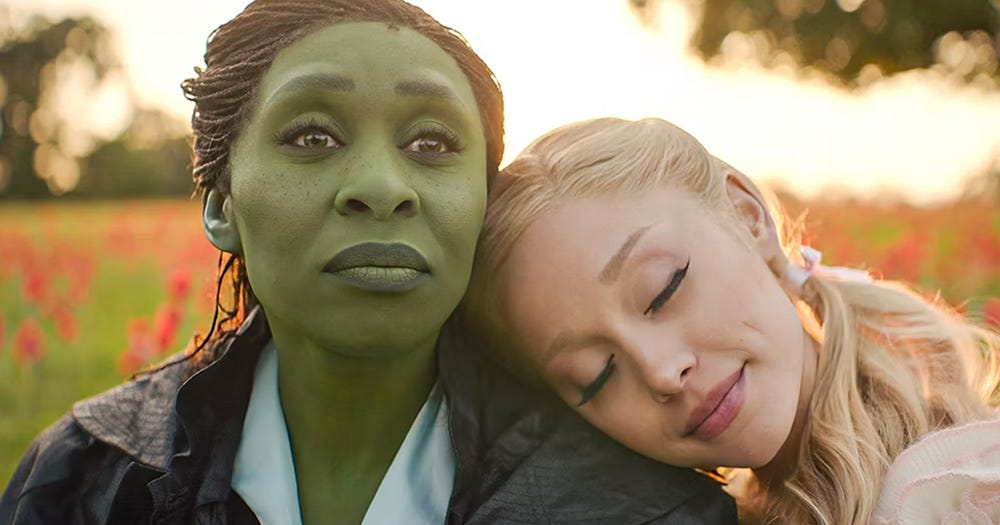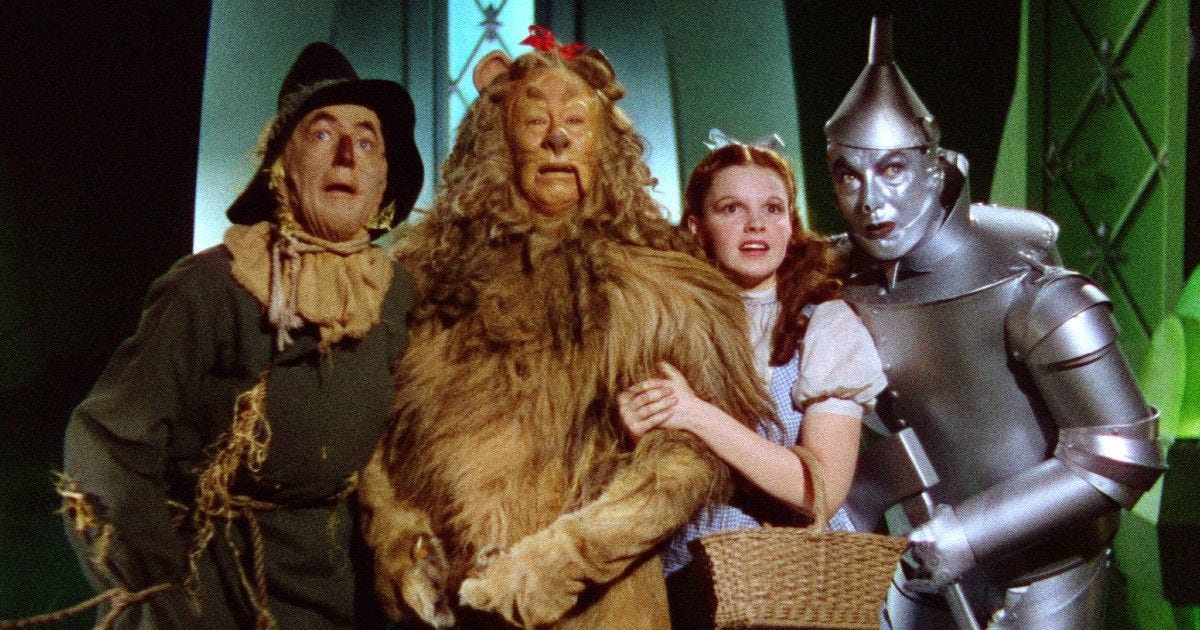This is Clusterhuck, my newsletter about faith, culture and a flourishing future for all! I’m glad you’re here. I can only do this through the support of my readers, and I’m grateful for every one I’ve got. If you’d like to join, just click here. You’ll get a free seven-day trial, including access to all the archives.
I saw Wicked. I hope you’re happy! I was prepared to ignore it after the disastrous marketing campaign, but I’m loath to miss out on a monocultural moment and Wicked is definitely shaping up to be one. So I did my duty as a movie appreciator. Did I like it? Well …
Let’s take a minute to reflect on the impossible legacy of The Wonderful Wizard of Oz. Is it the most successful kid’s book in American history? It was a sensation upon its publication, but now it’s hard to believe it was ever published at all. The Wizard of Oz feels like one of those stories that’s always been there, like it washed up on the shore with the Mayflower. It drew inspiration from Alice in Wonderland and Peter Pan, but its cultural shadow looms larger than either of those, at least in the American imagination. Frank L. Baum set out to write a children’s book. He ended up giving America her core fairytale.
To Baum’s credit, he never tried to backpack a lot of excess meaning and allegory onto his story. You’ll find harebrained interpretations out there suggesting The Wizard of Oz was Baum’s treatise on populism with the Cowardly Lion representing William Jennings Bryan and the Tinman representing industrialization and blah, blah, blah. It’s not that deep! It’s pretty straightforward even by YA standards. Dorothy Gale is not the Chosen One fulfilling the ancient prophecies, nor is she a disobedient child who needs to be taught a lesson. The Wizard of Oz is a story about a kid and her dog trying to get back to Kansas and the friends they make along the way. It’s pretty simple. But simple isn’t the same thing as easy.
Baum was skilled at populating Oz with the sort of disconcertingly odd characters that resonate with young readers. Kids snatch bits and pieces of the grownup world around them and arrange them into shapes that they can grasp. Doing this work for them is not rocket science, but it is an art. Most authors writing for kids just dumb everything down, but kids aren’t dumb. At least, they’re no dumber than the rest of us. Kids operate on childhood logic, and that’s the logic of The Wizard of Oz. The story runs on primal energy: colors (yellow brick roads, ruby* slippers, Emerald Cities), desires (home, courage, heart, brains) and cardinal directions (West = bad, East = good). It’s not every author who’s capable of tapping into that old magic. Baum did, and it struck an immortal chord.
And in true American fashion, we’ve rung it out for every dime possible. But there’s an obscene amount of juice in the story, which is a testament to Baum’s novel. The movie is one of the greats, as timeless as they come. Have you watched The Wizard of Oz lately? Man, they don’t make ‘em like that anymore. Then you’ve got all the various sequels and spinoffs and riffs and parodies and, well, some of them are better than others. I know The Wiz has its defenders (including my dad, who adores it) but it doesn’t work for me (sorry, Dad!). The Wiz is better than Sam Raimi’s disastrous Oz the Great and Powerful, but not nearly as good as Spirited Away, which drew clear inspiration from the Baum story. And then there’s Wicked.
It’s been a while since I read Gregory Maguire’s book, but my recollection is that it’s a pretty grim, thorny tale. No surprise. It sprung from the Edgy Boom of the 90s. America was on the hunt for dark sides. Bill Clinton had a dark side. OJ Simpson had a dark side. Who else had a dark side? The Wizard of Oz was ripe for this sort of exploration, and had already sprung several twisted pieces of lore1. “Forget everything you think you know about the Wizard of Oz,” Maguire smirked. “The Witch ain’t the only wicked thing in Munchkinland.” Some of the sex and violence is pretty puerile in a “this ain’t your grandma’s Oz” way. But the character relationships are smart and the subplot about animal rights in Oz, which sounds so silly on paper, ends up working pretty well.
I don’t really know what Stephen Schwartz saw in Maguire’s book that made him think it could be a musical2 but he brightened things up considerably. He took the bare bones of Maguire’s story, sanded down the edges and replaced the sex and violence with cute songs, and spun yet another commercial juggernaut out of Baum’s source material.
I’ll be honest and say Schwartz’s musical doesn’t do it for me. I think his plot runs out of steam after the first act and a lot of the songs are pretty forgettable. But, hey, what do I know? Wicked is a Broadway sensation, and they’ve been trying to turn it into a movie for ages. And somehow, despite hosting one of the most tortured pre-production yellow brick roads in recent memory, the movie feels like it’s landed more or less right on time.
Keep reading with a 7-day free trial
Subscribe to clusterhuck to keep reading this post and get 7 days of free access to the full post archives.






